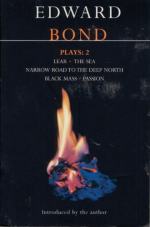|
This section contains 1,021 words (approx. 3 pages at 400 words per page) |

|
Epic Theater/Alienation Effect
Twentieth-century playwright Bertold Brecht (The Three-penny Opera) developed the modern concept of the epic theater for use in his political dramas. Unlike conventional drama, epic theater develops from a sequence of many scenes, as in Lear, that often take place over a considerable time period and employ a large number of characters. The continuous movement from scene to scene is meant to keep the audience from becoming too emotionally involved with the characters. This lack of emotional involvement is also developed through Brecht's alienation effect, which occurs when the audience is continuously made aware that it is not watching reality but a play.
In Lear characters periodically speak to the audience rather than to one another. This sort of speech is called an "aside" and contributes to the alienation effect. When Warrington is tortured, the darkly comic comments of Bodice and Fontanelle remind the audience...
|
This section contains 1,021 words (approx. 3 pages at 400 words per page) |

|




